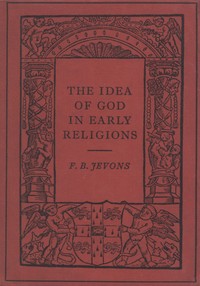| Author |
Jevons, F. B. (Frank Byron), 1858-1936 |
| Title |
The Idea of God in Early Religions
|
| Note |
Reading ease score: 49.8 (College-level). Difficult to read.
|
| Credits |
E-text prepared by Juliet Sutherland, Jeannie Howse, and the Project Gutenberg Online Distributed Proofreading Team (http://www.pgdp.net)
|
| Summary |
"The Idea of God in Early Religions" by F. B. Jevons is a scholarly examination of the concept of divinity in early religious systems, written in the early 20th century. The work delves into how societies have perceived gods, exploring the distinctions between gods, fetishes, and the roles they play within communities. Jevons aims to uncover the evolution of religious consciousness, focusing on the social and emotional aspects of worship and the underlying philosophies that inform early religious practices. At the start of the text, Jevons outlines the foundational premise that individuals are born into a community with pre-existing beliefs and social constructs. He discusses how humans learn to communicate and internalize the norms and ideas of their society, including their concept of higher powers. By examining the differences between fetishism and polytheism, he argues that the idea of a god functioning for the welfare of the community emerged alongside an individual's sense of self-awareness. This opening portion sets the stage for further exploration of ritual, mythology, and the communal consciousness surrounding the divine in subsequent chapters. (This is an automatically generated summary.)
|
| Language |
English |
| LoC Class |
BL: Philosophy, Psychology, Religion: Religion: General, Miscellaneous and Atheism
|
| Subject |
Religion
|
| Subject |
God
|
| Category |
Text |
| EBook-No. |
25338 |
| Release Date |
May 5, 2008 |
| Copyright Status |
Public domain in the USA. |
| Downloads |
75 downloads in the last 30 days. |
|
Project Gutenberg eBooks are always free!
|

